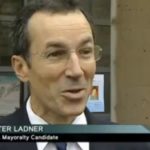Will the chief resilience officer be Vancouver’s most expensive ‘free’ hire?
There are plenty of important senior management positions in a city the size of Vancouver, but can you recall when the mayor called a news conference to announce new personnel?
Me neither.
That is of course what happened when Gregor Robertson announced the hiring of Katie McPherson as the city’s Chief Resilience Officer, or CRO.
McPherson, who was already working as a manager for emergency preparedness for the city, lists 10 years employed in the tree planting industry on her LinkedIn profile. She concluded that work for the Brinkman company, which was co-founded by Liberal Member of Parliament Joyce Murray, in 2011.
The announcement of McPherson’s appointment was also accompanied by the appearance of a spokesperson from a U.S.-based program called 100 Resilient Cities, and an opinion column written by that organization arguing the need for this hire.
So what exactly is a CRO and why did the mayor sound the trumpets?
For the “initial” two-year term position (meaning it could be continued), McPherson will liaise with something called the 100 Resilient Cities (100RC) program. “Resilient Cities” and McPherson’s position are funded by the Rockefeller Foundation, based in New York City.
The Rockefeller Foundation is a century-old philanthropic organization that was founded by John D. Rockefeller whose estimated worth at his passing in 1937 in today’s dollars would be about $340 billion. That is about four times the wealth of Bill Gates.
The Rockefeller fortune was built in the oil refining business. Today, the Rockefeller Foundation reportedly has more than $4 billion in assets. Its elite board of directors includes several prominent bankers from the United States, India and Africa. The Foundation’s president Judith Rodin is reported to be a close ally of Bill and Hillary Clinton.
What compels the Rockefeller Foundation to fund the hiring of management positions in cities selected from around the globe? That is to be seen, although one has to endure endless buzzwords and bafflegab to understand the mission.
The two words you will hear repeatedly from 100RC spokespeople are “stresses” and “shocks.”
City hall reporter Mike Howell asked McPherson what the job will entail. Here’s part of her response.
“To really look holistically…assess where the gaps may be and leverage the resources and skills that will come from 100 Resilient Cities to address those gaps and to help to fast-track actions…”
The mayor’s explanation was no better, saying something about “our lowest common denominator is raised up and we don’t suffer from weaknesses that are exposed under great stress.”
Um, OK.
Cities are already doing disaster planning, so why the need for a CRO?
Will the chief resilience officer be Vancouver’s most expensive ‘free’ hire?
In researching this column, I discovered that many Canadian academics and municipal officials are already involved with a robust national organization focused on disaster resilience planning. The Canadian Risks and Hazards Network (CRHNet), holds a well-attended annual symposium, and even has its own quarterly published magazine.
In a 2014 interview with Charlie Rose, Judith Rodin said, “In the 21st century, crises may be the new normal. There actually isn’t a week that goes by that somewhere in the world there isn’t a violent storm, a flood, or a cyber-attack, civil unrest, a new epidemic, an outbreak like Ebola.”
These gloomy forecasts (“shocks and stresses”) are the key to the Foundation’s sales pitch to cities. Let us help you hire a manager, while you build up resources to support the office.
It is hard to imagine the CRO’s wide-ranging mandate to collaborate with so many organizations could be accomplished without at least 10 to 20 support staff.
Then there are the international conferences where the 100RC CROs are to meet. More costs there.
Then there is the “Platform of Partners,” which are the foundation’s pre-selected goods and services providers for data collection, insurance, and financial services 100RC cities can avail themselves of.
Finally, there is something called a “Detailed Resilience Pledge,” which several 100RC cities have already signed, where cities agree to spend “the equivalent of 10 per cent of the city’s budget per annum to fund defined resilience goals, as outlined in our [current or future] Resilience Strategy.”
No wonder Gregor Robertson did a full court press of publicity on McPherson’s appointment.
With no terms of reference made public yet, this could be the most expensive “free” hire in the City of Vancouver’s history.
~ ~
**UPDATE: I was contacted by a representative of 100 Resilient Cities by email after this story was published. The contact said there were some “basic misunderstandings” of the program in my column and they would like to discuss with me further. I responded that I welcomed that conversation, then never heard back.
– Originally published in Vancouver Courier newspaper



